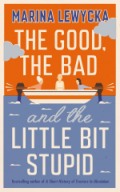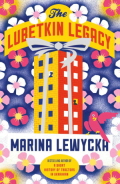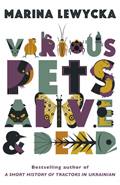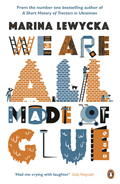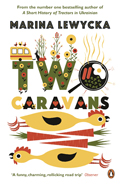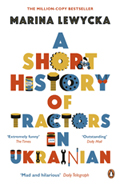A Short History of Tractors in Ukrainian
![]()
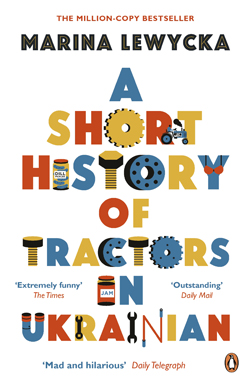 "Two years after my mother died, my father fell in love with a glamorous blonde Ukranian divorcee. He was eighty-four and she was
thirty-six. She exploded into our lives like a fluffy pink grenade, churning up the murky water, bringing to the surface sludge of
sloughed-off memories, giving the family ghosts a kick up the backside."
"Two years after my mother died, my father fell in love with a glamorous blonde Ukranian divorcee. He was eighty-four and she was
thirty-six. She exploded into our lives like a fluffy pink grenade, churning up the murky water, bringing to the surface sludge of
sloughed-off memories, giving the family ghosts a kick up the backside."
When their recently-widowed father announces he plans to remarry, sisters Vera and Nadezhda realise they must put aside a lifetime of feuding in order to save him. His new love is a voluptuous gold-digger from the Ukraine half his age, with a proclivity for green satin underwear and boil-in-the-bag cuisine, who stops at nothing in her single-minded pursuit of the luxurious Western lifestyle she dreams of. But the old man, too, is pursuing his eccentric dreams - and writing a history of tractors in Ukrainian.
A wise, tender and deeply funny novel about families, the belated healing of old wounds,the trials and consolations of old age and - really - about the legacy of Europe's history over the last fifty years.
REVIEWS
GUIDE FOR READING GROUPS (this was included in the Penguin Press US edition)
A PENGUIN READING GROUP GUIDE TO
A SHORT HISTORY OF TRACTORS IN UKRAINIAN>
Marina Lewycka
AN INTRODUCTION TO
A Short History of Tractors in Ukrainian
"Marriage," writes Marina Lewycka, "is never just about people falling in love, it is about families." Lewycka's debut novel, A Short History of Tractors in Ukrainian, begins as narrator Nadia's widowed father announces his intention to marry a glamorous divorcee fifty years younger. His two feuding daughters realize they must unite to free their father from the clutches of Valentina, a Ukrainian bombshell and "boil-in-the-bag cook" with 'superior' breasts and a "genius" son, whose demands on the elderly man only begin at marriage. Family secrets are revealed, and the tragic history of Ukraine is revisited in this moving, informative, and laugh-out-loud funny family drama.
Nadia is a sociologist, while her sister Vera is more of a socialite, and they haven't spoken to each other since their mother died. Now, brought together by their father's apparent second adolescence, they conspire to oust the newcomer and preserve the sanctity of their mother's home and garden, Along the way the two sisters confront differences that shadowed them have throughout their childhoods and Nadia learns for the first time of the wartime events that contributed to the very different worldviews she and her sister hold, finally realizing the privilege she has enjoyed as her parents' "precious peacetime baby."
Meanwhile, fired up by passion, Nikolai is writing his own eccentric contribution to human knowledge, a history of tractors, through which Lewycka offers us insight into the social and political events that shaped the last century: war, peace, repression, famine, ecological disaster - the tractor played its part. , Lewycka reminds us of the difficult choices that immigrants must make between what to remember and what to forget about their pasts.
Nadia's vibrant voice, knowing, self-deprecating and witty, acts as both guide and interpreter for her complicated and sometimes outrageous family. In the end, A Short History of Tractors In Ukrainian is her story, as she learns to redefine her role in a new family, one that must reconcile the loss of her mother with the new hopes and desires of her compromised father. Though all the characters at times yield to their worst impulses, their charm is that they struggle through as we all do: eager and resentful, yearning and unyielding, loving and infuriated in equal measure. Nadia in particular comes to terms with a history both personal and global, in a brilliant first novel that bears witness to the human struggle for dignity even as undertaken by the most undignified of people.
A CONVERSATION WITH MARINA LEWYCKA
1. You were born in a Ukrainian refugee camp, just like your main character Nadia. Have you been back to Ukraine? Can you tell us a bit about what was it like to grow up the as an immigrant in England?
I had grown up in England thinking of myself as essentially English, though with a name that most people couldn't pronounce, and a few family eccentricities - well, everyone has those, don't they?
I was acutely aware of the difference between the way my parents saw themselves, as educated and professional people, and our actual circumstances, which were quite poor. But like many immigrants, my parents believed that hard work and education were the keys to success in our new world. I am so sorry that my mother died before she could know about the success of my book.
As a child, I was too busy trying to adapt and fit in to give much thought to my Ukrainian roots. Besides, my parents always told me that they were the only survivors in our family; everyone who had stayed behind in Ukraine, they believed, must have perished in the war. So I thought of myself as a bit of human flotsam washed up on a faraway shore.
It wasn't until a whole year later, when the book was well on its way to publication, that I found three mysterious letters in Cyrillic script in my email inbox. One of them was from someone in Israel who claimed to be related to an uncle of my grandmother. Hmm. A likely tale, I thought. I had forgotten all about the family search website. The other two seemed even more unlikely: one claimed to be from my father's niece, the other from my mother's sister. I thought this must be one of those internet scams where I would be asked to send huge sums of money to these putative relatives. But, just in case, I replied, with a couple of 'trick' questions, that only real relatives would know the answer to.
The letters that came back brought tears to my eyes. Not only did they answer the questions, but they sent a whole family tree. And there were photographs - they must have scanned them in - of my grandparents whom I had never met, of aunts, uncles, cousins - there are dozens of them over there! Photos of my parents as children and later as young adults. How familiar and yet how different they looked, in their quaint 1930s-style clothes, their faces unlined, and laughing as though they had no idea what life would throw at them.
And alongside all the old sepia photographs, some colour snaps of my new Ukrainian family: my cousin Marina, who is the daughter of my father's sister, now in her sixties and living in Moscow with her daughter and grandchildren. And my cousin Yuriy with his mother Oksana, who is aged 86 and still living in Luhansk. Oksana is my mother's sister; they hadn't seen each other since 1943. This summer, my daughter and I went over to visit them. But while I was doing some of the background research for the novel, I found much more than I had ever thought would be possible. I came across a Russian family-search website and out of curiosity I typed in my surname and my mother's maiden name, sent it off, and forgot about it.
2. Were your parents, like Nadia's, reluctant to discuss their past, particularly wartime events? How well informed were you about life in Ukraine when you were growing up?
I think all parents want to shield their children from the true nature of the adult world, especially when they have experienced the barbarities of a century like the last. My parents hadn't talked to me about the hardships they had lived through. But a couple of years before my mother died, I did talk to her, and recorded what she said on tape. That tape, I thought, would one day be the basis of a novel.
In the end, I wrote a different novel, but my mother's story is in there, threaded in among all the other stories. The descriptions of Ukraine are based on the stories my mother told me about her childhood. To me, the country was always like the 'blue remembered hills', a place of mythical beauty. Of course, like all myths, it owes much to the imagination - both hers and mine.
3. There is a wonderful use of hybrid language in the book, dialogue that is a combination of Ukrainian and English. Did you spend some time listening to people who talk like this or did this voice come naturally to you? Do you have favorite phrases, or ones that you yourself use in your everyday life?
Actually, some of the expressions which sound outrageous and ridiculous in English are just literal translations of what people would say in Ukrainian. Every language has its figures of speech and imagery which we take so much for granted that we hardly notice, but translated into a foreign language they sound quite startling. I think all immigrants speak in these hybrid languages - I love to listen to the speech of the Asian families who live near me in Sheffield. You can have such fun with language once you realize that you can break the rules.
4. The sections of the book on tractors offer both technical information and a history that verges on poetry. What was it like to write this document into the middle of your novel? How did you come up with the idea to have Nikolai write this treatise? Did you have a prior interest in tractors?
Among the earlier readers' reviews on the Amazon website, there was one which said: "Be warned. This book has nothing to do with tractors. The author should be ashamed of herself!" To be honest, I didn't have a prior interest in tractors, and I hadn't intended to give them such a prominent role in the book - they were to be just a bit of background fun - but once I started researching them, I was hooked. And to my delight, I found there was a whole community of tractor enthusiasts out there, willing and eager to share their technical knowledge. What was more difficult was fitting it into the social-political framework which I think is quite interesting. I keep finding out new things, and thinking to myself, Oh, I wish I'd put that in the book!
5. Valentina is a remarkably forceful character, both for the people in your book and for the reader. What or who was the inspiration for her? Did your idea of her change over the time you spent writing the book?
If you look on the internet, you will find pages and pages of websites of young Russian and Ukrainian women desperately seeking a husband and a new life in the West, in order to escape economic hardship at home. There also seemed to be a flurry of different stories were in the press, and of course it was a situation that I had come across in my work on elder care, not just old men falling for unscrupulous young women, but also old women being swept off their feet by handsome young conmen. I set out to depict a predatory and vulgar woman. But I think that, like the old man, I fell in love with Valentina. Her sheer energy and vitality, her magnificent awfulness stole my heart - and my novel.
6. Your narrator Nadia struggles to understand Valentina, and to resist her worst impulses towards her. Was it hard to find the right tone when writing about Valentina, to show both her callow and callous nature and also to try to understand what made her that way?
At the beginning, Valentina was more of a caricature, but as I fell in love with her, I tried to understand who she really was, and how she came to be as she was. Once I had understood how much she was prepared to sacrifice in her desire to better herself, and her commitment to her son, it was hard to be wholly unsympathetic. I've found that writing is a strange process - you don't really know your characters at the outset of a book, any more than the reader does. You write your way into their psyche, and then you have to go back and rewrite them from the beginning, so that they make sense for the reader.
7. This is a seriously funny book. Was it difficult to maintain a balance between the comic elements of the story and the more serious subject matter? What do you think enabled you as a writer to move back and forth between the two?
One of the wonderful things about writing is that the idea you start out with is not necessarily the one that gets written. The characters have a way of taking over, and that's what happened in my novel.
I certainly didn't set out to write a comic book. I had thought I would write something profound and sad about the 'human condition', and I ended up winning a prize for comic fiction. Maybe the human condition is funnier than we think at the time.
8. Your previous professional specialty has been elder care, and A Short History of Tractors in Ukrainian is immensely sympathetic toward Nikolai as he struggles with the disconnect between his desires and abilities. It's very refreshing to read a book that deals with an elderly person who is so complex. Did you originally set out to include this topic as a plot element? Did you enjoy working with the subject in fiction as well as in real life?
When I was writing for Age Concern, I spent a lot of time listening to the stories of older people, and their loving but exasperated sons and daughters. There is such a mismatch between the way older people perceive themselves, and the way they are perceived by society. And I was struck by how little this turbulent area of human relationships is represented in fiction.
There is a time in every family when the older people give up the struggle to be sensible, and to be providers, and to keep the show on the road. They hand over the reins of common-sense to their offspring, who are often ill-prepared and disinclined to suddenly start behaving like adults, and decide to have one last burst of youth, a second adolescence. Of course, after that comes second childhood, and second babyhood, and death itself. So why not make the most of the good times, even at the risk of embarrassing your children?
9. There are so many vivid characters in this book, people who seem larger-than-life and yet utterly human. Do you have a favorite character, one that was most interesting or fun to write about?
You know, in real life, we often think nasty and uncharitable thoughts about people which we are much too nice to ever give voice to. What I really enjoyed about writing this book is being able to put all those unacceptable thoughts into words: the rows and arguments, the uninhibited bitchiness with which the sisters accost Valentina and each other, the sheer brutality with which Valentina abuses the old man, and the old man's unbridled dottiness. Each of the characters indulges in uninhibited bad behaviour - and bad language - and that's what I most enjoyed writing about.
10. A Short History of Tractors in Ukrainian is your first novel. Do you have plans to write more fiction? Will you write more about this extremely entertaining family?
I am half-way through my second novel now, and I'm enjoying it just as much as A Short History of Tractors in Ukrainian, though the theme is rather different. It's not about a family, but it is about love, which is also a source of much joy, sorrow, and folly. It does have some very funny characters, and it's also got a global dimension. But you may find it puts you off eating chicken.
QUESTIONS FOR DISCUSSION
1. The novel begins with Nikolai's dramatic announcement that he plans to remarry to a woman fifty years younger than he. Nadia at first responds by trying not to judge, and instead diplomatically asks questions about both parties' motivations. What would you do if you had a parent or family member who seemed to be entering into such a flawed allegiance? How far would you go to stop such a wedding? Do you think that Nadia responds appropriately?
2. What do you think Valentina's real motives are? Does she really want the best possible life for her son, is she simply after money, or does she seek love and contentment for herself? Go back to some scenes in the novel where she explains what she wants and defends her own actions against the accusations of Nadia and her sister. Whom do you believe? Do you feel sympathy for Valentina?
3. Nadia's father becomes embroiled with Valentina for a variety of reasons, including his loneliness, romanticism, and generosity. Make a list of his motivations. Which do you think are most important to him? Is her considerable-and oft-advertised-sex appeal her primary attraction, or do you think it might be something else? What do you learn about his attitudes towards life and people from his book on tractors?
4. Consider all of the ways in which sisters Vera and Nadia are different. How do they define themselves and each other? What influence does their childhood, and their difference in age, have on their personalities and current relationship with each other? What role does the family's wartime experience play? What does Nadia mean when she says that she and her sister quarrel over "the inheritance of character, of nature"?
5. How does Nadia's attitude towards Vera change over the course of the novel? What enables this evolution? Try to describe the state of their sisterhood at the end of the book and make some guesses about how it might continue to grow or evolve in the future. What kinds of grievances do Vera and Nadia decide to let go of, and which begin to seem less important? Have you ever had a conflict with a family member that you could not resolve without compromise, one profoundly rooted in the past?
6. Stanislaw is one of the more complex characters, in part because he is not in control of his own destiny but is instead subject to the whims of his mother and other adults. Though he is no innocent, he is in some ways a victim. Return to some sections of the book that deal with Stanislaw. Try to imagine the story from his point of view. Who would you trust in his situation? What would you hope for?
7. Do you think it's fair of Nadia and Vera to try to have Valentina deported? What would her life be like back in Ukraine? What about Stanislaw's future? Consider what both she and Nikolai say about life back in their homeland, both in the past and present. Do you think Valentina's aspirations for a life in England are similar to those of other immigrants? How does Nadia struggle with the dissonance between being an immigrant herself and trying to deport an aspiring one?
8. How does Nadia's vocation as a sociologist influence her approach to her family and to Valentina? Does it help her see the situation more clearly than others? Consider some of the times in which she seems to analyze circumstances more as a professional and others in which she responds less rationally. What does this suggest about the benefits and limitations of our attempts at logical explanation, particularly as regards our families?
9. One of the main points of contrast between Nadia and Vera's mother and Valentina is their differing approaches to cooking and housekeeping. Go back to scenes where Nadia reflects on her mother's garden in particular, and contrast that with the way Valentina keeps house. Which approach more closely matches your own? Do you think the differences might be attributed to generational changes? Or is there some deeper meaning about character and love that is revealed in their attitudes towards these tasks?
10. Valentina, crass, tacky, and pushy, is the center around which all characters revolve in this novel. How do different characters respond to her and why? What are some of the explanations that minor characters give for her behavior? Locate points in the book where people other than Nadia, Vera, and their father describe, respond to, or explain Valentina. Whom do you most agree with? How would you describe her?
11. Nadia says midway through the book that she "had thought this story was going to be a knockabout farce, but now I see it is developing into a knockabout tragedy." Think about some of the more serious scenes and stories in the book, those that are tragic or frightening in nature. How much danger is Nikolai really in? How scarred is Vera by events that happened before Nadia was born? How does Lewycka retain the comic elements in spite of such subject matter?
12. How would you define Nikolai's book, "A Short History of Tractors in Ukrainian," which is a book within the novel? Is it a history? A technical manual? A memoir? What does Nadia learn from reading this book, aside from facts about tractors? Consider also how it functions in the novel to provide crucial information for the reader about history and ideology. What does Nikolai accomplish through its writing?
![]()

